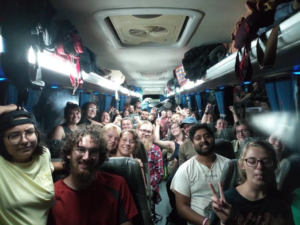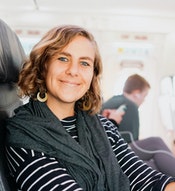The Peace Corps Is Suspended—Here’s Why We Need to Make Sure It Returns
Thanks for the ‘heads up’ from Paul Koprowski (Ethiopia 1962-64)
The Peace Corps Is Suspended—Here’s Why We Need to Make Sure It Returns
By Jessie Beck (Madagascar 2011-13)
AFAR Travel Magazine
04.30.20
Ninety-two percent of Peace Corps volunteers say the experience has changed their lives.
In the Peace Corps, you learn that travel isn’t just about hotels and the sights. It’s about the people and connections you make.
On March 15, 2020, the Peace Corps announced the evacuation of all 7,000+ volunteers from 60+ countries and suspension of all operations. With just 24 hours’ notice, all volunteers were asked to pack up their bags, say goodbye to their host communities, and return to the United States.
I can only imagine it was a difficult, but necessary, decision. Keeping volunteers safe and healthy is a top priority for the organization, and it would have been a struggle to provide adequate healthcare to volunteers in a global pandemic. While smaller evacuations aren’t uncommon, a global one—like many things in our COVID-19 world—is unprecedented.
As a returned Peace Corps volunteer (RPCV), the news of the evacuation hit me on a personal level. I was an ESL teacher in Madagascar from 2011 to 2013 and understand the long-lasting effect that serving has on volunteers and the communities they serve: not just in terms of the work that they do, but also on the lifelong, experiential travelers they become.
Before I joined the Peace Corps, I thought it attracted a certain “type,” since every RPCV I met was patient, curious, resourceful, and (usually) a little bit eccentric. I’d later learn our shared qualities aren’t what drove us to join but rather are the result of having served in the Peace Corps.
With time, and with experience as an employee at AFAR, I now have an even broader perspective: I understand that the individuals who come out of the Peace Corps are an important part of the experiential travel community: individuals who practice the principles of respect and interest that are at the heart of being a traveler, not a tourist. This, among many other reasons, is why we need to make sure the Peace Corps returns.
A legacy of lifelong travelers
I was lucky. I left my assignment simply because my 27 months of service were up. I was handed a certificate, resettlement allowance, and cash in lieu of a plane ticket home, which I used to travel for three months in East Africa and Asia with another RPCV, Liz, where we put our new perspective on travel into action.
On our last evening of a gorilla trek in Uganda, we insisted to our tour guide that we wanted Ugandan food for dinner instead of the generic, Western-ish menu at our hotel. “Tourists never ask to eat at a local place,” he told us over bowls of a maize porridge called ugali. We were all about the same age and bonded over pop culture, life in Africa, and dreams about our future careers. He let Liz drive the jeep (just for kicks) and we went along with his impromptu birding detours (he was an enthusiastic birder). “When we’re back in Kampala, you should come to a comedy show with me—as friends! We can get some grilled fish, too,” he said. We took him up on the offer and were quickly called out at the show by a comic for being the only muzungu in the audience. Still, our efforts to make a human connection had led us to local spaces and allowed us to get to know a side of Uganda outside the tourist circuit.
I’m not the only volunteer whose travel style has been affected by serving in the Peace Corps. Ann, an RPCV who served in Tanzania from 2015 to 2017, lived with a host family for her first three months, which she says created a foundation for her service. By living with a family who had experience introducing foreigners to life in Tanzania, she was able to learn how to better navigate the new culture. It’s an approach that’s stuck with her: “Now, I always try to stay in small, family-owned guesthouses or homestays when I arrive in a new country,” she says. “It makes me feel safer and helps me get my footing in a new place.”
By getting to immerse ourselves so fully in another culture, learning the language, customs, and lifestyle, the Peace Corps also teaches us that we can only learn so much from a quick one- or two-week trip. “It took many years before I could visit a country without a gnawing feeling that I was missing the true nature of the place—the understanding that could only be approached, however imperfectly, by settling in for a few years,” says Terry, a volunteer who worked on inland valley rice cultivation in Sierra Leone from 1980 to 1983. For many of us, this feeling drives us to travel deeper: to make the most of every trip, no matter how quick, and to get to know about the language, current events, and customs of a place.
In a 2011 study for its 50th anniversary, the Peace Corps found that 92 percent of RPCVs said their service changed their lives. Among the things they most valued from their experience were the appreciation they developed from other cultures (69 percent) and the friendships they formed in the community (43 percent). Other survey results show that RPCVs feel that their greatest impact was not in technical assistance, but rather being agents of “soft diplomacy” for the United States—the benefits, as with travel, of getting out into the world and exchanging ideas.
Of course, it’s not just about the volunteers. The Peace Corps can also affect how individuals in host communities approach travel and learning about new cultures. A group of Malagasy ESL teachers I worked with insisted I continue teaching the monthly cooking classes started by a previous volunteer because they “wanted to learn more about other countries by cooking their food.” Other community members asked me to help them create Facebook accounts to “meet people from outside of Madagascar.” On both sides, Peace Corps experiences prove that human-to-human connections inspire curiosity, openness, and cultural exchange. Most importantly, they can make what’s new or different seem less intimidating.
“I’m more willing to go anywhere now,” says a fellow Madagascar RPCV, Ashlyn, whose first time abroad was in the Peace Corps. “Nothing scares me anymore.”
Support for the Peace Corps
For the first time since John F. Kennedy launched the program in 1961, there are no active Peace Corps volunteers (PCVs) anywhere in the world right now. No scientists on sabbatical teaching biology to kids in Kenya. No former journalists creating community centers in Costa Rica. No engineers building water and sanitation solutions in the Philippines. No thoughtful travelers or global citizens among volunteers and host communities in the making.
The Peace Corps was put on pause because of COVID-19 with hopes to be back soon. But it’s becoming clear the world won’t be going back to the way things were. The United States and the global community are heading to a new normal, but I can only hope that the Peace Corps is part of it. Now more than ever, we need the compassion and global citizens it creates—both among volunteers, the friends they make in their homes abroad, and the cross-cultural understanding it promotes. We’re all in this together.
If you want to support the Peace Corps and help ensure its future, Glenn Blumhorst, president and CEO of National Peace Corps Association, suggests letting your member of Congress know that you value the Peace Corps and its mission at home and abroad. Once the Peace Corps is back in action, consider a donation to volunteer projects as well as other nonprofits, like Books for Africa, which work alongside the Peace Corps for global aid.


Compelling! Well said! Contacting your Representatives and BOTH Senators in support of the continuation and adequate funding of Peace Corps is necessary – the most effective way to assure its future.